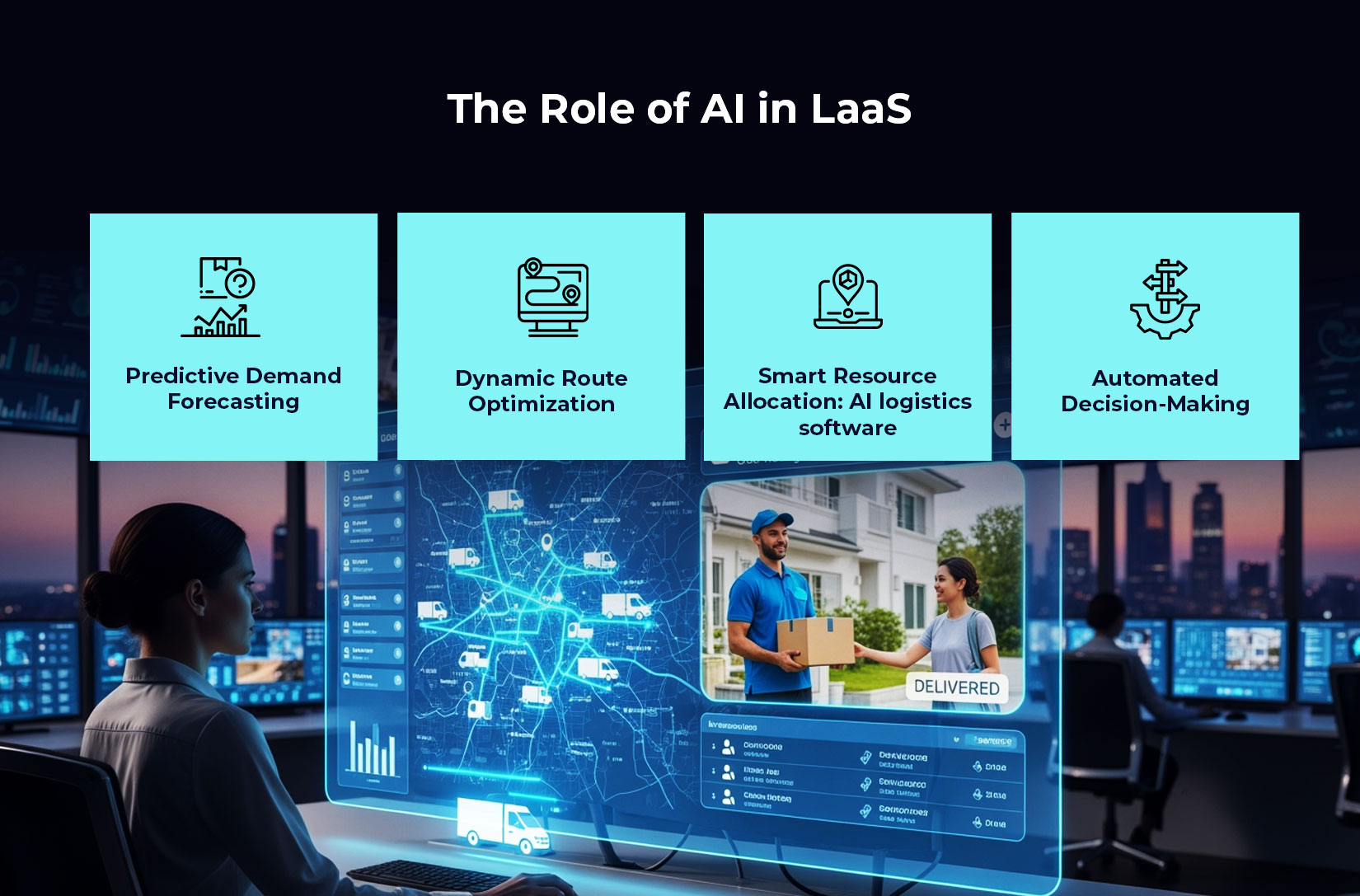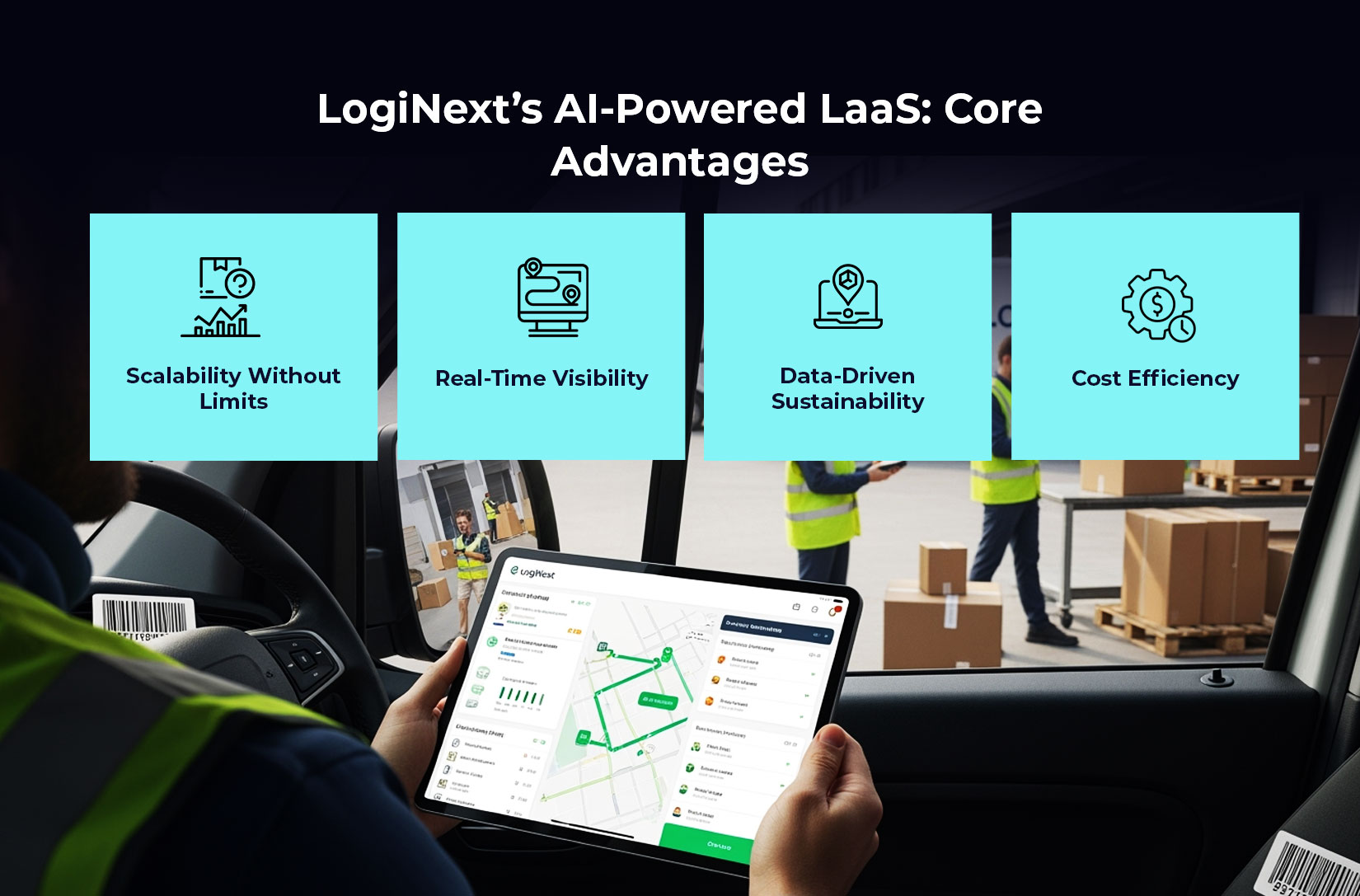
LogiNext LaaS Innovation: Where AI Meets Logistics as a Service
In a digital-first economy, logistics has shifted from simply moving goods. It has shifted to create a seamless, data-driven, customer-centric experience. Enterprises are being told to deliver it faster, cheaper, more sustainably and keep disruptions under control. LaaS (Logistics as a Service) is beginning to change that, and LogiNext is founding the way forward with its AI-powered LaaS platform.
LogiNext is broadening the horizon of what enterprises can anticipate from their logistics operations. By combining automation and predictive intelligence we can begin to explore the impact of AI logistics software. Along with LaaS software on the next era of supply chain innovation.
What is LaaS and Why Does it Matter?
Logistics as a Service (LaaS) is fundamentally the same as Software as a Service (SaaS). Instead of spending capital on heavy infrastructure and inflexible systems, businesses can now plug into a flexible cloud-based logistics model.
According to Gartner, 60 percent of supply chain leaders believe outsourcing to digital platforms such as LaaS will be a foundational building block of resilience in the next five years. The motivation is clear – they want to scale without sacrificing control.
For enterprises, this means:
– Easy access to AI-enabled LaaS without the accrued investment.
– Complete visibility across fleets, warehouses, and last-mile operations.
– Faster time in response to volatile market demands.
LaaS takes the guesswork out of operations – no more fire-kids delaying and disrupting. You plan, optimize, and execute with real-time intelligence.
The Role of AI in LaaS

The real noticeable difference with LogiNext’s AI-enabled logistics as a service platform is that artificial intelligence is integrated so deeply into every process. Conventional logistics systems have always been reactive and done so after a disruption or delay has occurred. AI in logistics can provide a whole different experience by helping to predict issues. So that they are dealt with before they are noticed and by automating solutions at a much larger scale.
1. Predictive Demand Forecasting:
AI models can analyze previous sales, web traffic, weather, and seasonality data to predict spikes in demand with greater accuracy.
2. Dynamic Route Optimization:
Real-time information on traffic and road condition means drivers are always on the quickest and cheapest route.
3. Smart Resource Allocation:
AI logistics software helps to improve resource utilization by reducing whether assets are idle, workloads are distributed correctly and eliminating fuel waste.
4. Autonomous Decision Making:
AI automatically assigns drivers, trips, delivery windows, etc., therefore reducing human intervention by at least 70%. And also reducing operational hours and errors.
As per a McKinsey report, organizations that leverage LaaS software, sometimes have 15% lower costs and 35% higher service levels.
LogiNext’s AI-Powered LaaS: Core Advantages

1. Scalability Without Limits:
Retailers, e-commerce players, and logistics players frequently face unexpected spikes, like holiday shopping or flash sales. LogiNext’s AI-focused LaaS platform dynamically scales resources to satisfy peaks of labor, logistics, and vehicle demand, without impacting day-to-day operations.
2. Real-Time Visibility:
Tracking logistics assets in transit has always been a blind spot for organizations. Leveraging IoT integrations and AI-backed dashboards, LogiNext provides full visibility for enterprises along their supply chain. This visibility creates trust with customers and reduces delays.
3. Data-Driven Visibility:
Organizations are facing increasing pressure from regulators and customers to be green. LogiNext’s AI models improve fuel utilization, reduce unnecessary miles and routes to customers, and ask or recommend green delivery alternatives. Research shows that through AI-led commitments to improve logistics, organizations can impact CO₂ emissions by as much as 10%.
4. Cost Efficiency:
AI logistics software removes inefficiencies and directly impacts the supply chain. By removing inefficiencies, organizationscangrowtheprofitabilityon their bottom line. Companies report between 20–25% savings in logistics costs after transitioning to LaaS platforms.
Use Cases of AI-Powered Logistics as a Service
The influence of Logistics as a Service is felt through all industries.
1. E-commerce & Retail:
Delivering on demand for same-day and next-day delivery while managing large-order volumes. With AI-powered LaaS, retailers can forecast demand, allocate and reallocate resources dynamically during peak times. Thereby, ensuring that deliveries are fulfilled accurately in the promised time windows even on peak days like Black Friday or at festive sale times.
2. Food & Beverage:
Delivering temperature-sensitive products to customers at the right temperature and on time. AI logistics software can provide real-time monitoring of conditions, optimal routing, lesser spoilage, and reduced waste while keeping or improving customer satisfaction.
3. Pharmaceuticals:
Complying with rules and regulations of transport with automated documentation. Automated documentation means all aspects of shipment from handling to chain-of-custody data tracked in real-time, leading to full visibility that is critical for shipping sensitive medical products.
4. Manufacturing:
Making inbound and outbound shipments in an increasingly global supply chain. AI-powered LaaS coordinates suppliers more simply, shortens transit delays with greater transparency, and allows manufacturers to operate on a just-in-time basis.
Why Enterprises Choose LogiNext’s LaaS Software
While there are several logistics providers, LogiNext is distinctively different in that areas of AI, Cloud and automation. Plus are all seamlessly integrated on one single platform.
– Proven Scalability: We provide logistics solutions for global enterprises in 50+ countries across the globe!
– AI at the Core: Each module is created using machine learning models, that gets smarter with each transaction.
– Seamless Integrations: LogiNext can integrate with ERP systems, E-commerce Platforms, while being not interrupting the workflow.
– Future-Read: Built to adapt to autonomous vehicles, drones, and robotics as they enter mainstream logistics.
The Future of LaaS: AI as the Default Standard
The logistics sector is moving toward intelligence-driven ecosystems from models that rely heavily on assets. In the coming years, AI-based LaaS will not be innovative, it will be the standard expectation. Enterprises will demand platforms that can forecast demand, allocate resources, and decide in real-time faster than human operators. The shift is not solely about efficiency; it’s about resilience in a world of inevitable disruption.
By 2030, studies predict nearly 80% of global logistics operations will run on cloud-based AI-powered platforms. As governments push for sustainability and customers demand speed, AI-based logistics as a service will be the backbone of modern supply chains. Organizations that fail to adapt will be left behind, but those today embracing LaaS will have a sharp competitive advantage.
Conclusion
The recent LogiNext LaaS innovations demonstrate that logistics can evolve from reactive firefighting to proactive orchestration. By integrating AI into every delivery, route, and resource, businesses gain agility, visibility, and sustainability on a massive level. AI-powered logistics as a service offers not just efficiency, but resilience for businesses grappling with the two-headed beast of rising costs and unpredictable demand.
The truth is simple: Logistics is not about trucks and warehouses anymore. It is about platforms and intelligence. With LogiNext LaaS software, enterprises are future-proofing their supply chain, one intelligent decision at a time. So, what are you waiting for? Click on the red button below and book a demo with LogiNext Solutions today!
45







@LogiNext